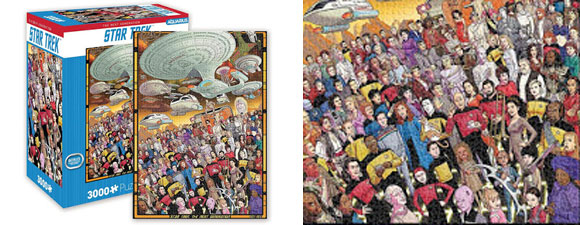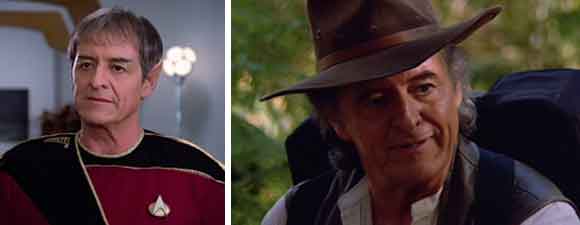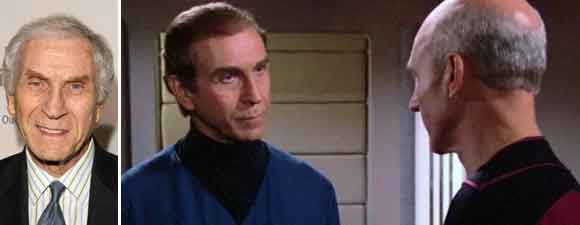Retro Review: I, Borg
6 min readWhen the crew rescues a lone Borg, Picard must decide whether to treat him like an individual or use him to disable the entire Borg collective.
Plot Summary: After picking up an alien signal, the Enterprise visits a planet where it finds a damaged ship and a single surviving Borg. Picard considers leaving him to die in order to protect the Enterprise, but Crusher insists that they have an obligation to help him. With LaForge’s help, she repairs the wounded Borg’s cybernetics and prevents him from communicating with the Collective. Picard realizes that if LaForge can rewire the damaged Borg’s internal systems, it may be possible to use him as a conduit to send a destructive command to all the rest of the Borg. Crusher objects that this is genocide, but the rest of the crew agrees with Picard that the threat the Borg pose to humans would justify such extreme action. Meanwhile, Three of Five recovers, allowing LaForge to name it Hugh and learning from him that humans do not wish to be assimilated. He tells Guinan that he loathes the idea of using Hugh to destroy his people, for whom Hugh is homesick. Guinan intially claims that Hugh would not show LaForge the same consideration, but she agrees to meet Hugh and is shocked when the Borg understands loneliness. She tells Picard in turn that he should speak to the Borg before using him as a weapon against his people. Picard, who has learned that a Borg cube is on the way, angrily refuses, but eventually he changes his mind. Hugh recognizes Picard as Locutus, but when Picard says that Hugh must prepare to assimilate the humans on the Enterprise, Hugh says that he will not attack his friend Geordi. Then Picard decides that to use Hugh as a weapon would be as wrong as Borg assimilation. He invites Hugh to remain on the Enterprise, but Hugh believes the Borg will track and destroy the Enterprise if he does, so he asks to be returned to the wreckage of his ship where the Borg can find him. Concluding that perhaps Hugh’s individuality will spread through the Collective like a virus, Picard sends Hugh back with LaForge, who watches as the Borg reassimilate Hugh. Before beaming away, Hugh meets LaForge’s eyes, demonstrating that he has not lost his sense of self.
Analysis: A nearly perfect episode, “I, Borg” picks up on three major arcs of Star Trek: The Next Generation: Starfleet’s dilemma about how to fight the implacable Borg, Picard’s personal evolution in the wake of his assimilation, and the philosophical exploration of individual rights so fundamental that no Starfleet mission can be justified in violating them. The ethical issues are akin to those from “The Measure of a Man,” though that episode is never explicitly referenced, Data remains mum on the subject of cybernetic equality, and Picard and Guinan both start out with the opposite position they took when Data was about to be defined not as a person but as a machine. They are countered intellectually by Crusher, who has increasingly become an activist for individual liberties – she’s just as distressed over Picard’s plans first to abandon the Borg, then to use him as a weapon, as she was when the Enterprise was being used to ferry the empath Kamala to an arranged marriage – but it’s LaForge who really bridges the gap between the crew and the Borg, sharing not only his values with Hugh but his personal feelings about assimilation and the importance of friendship.
By the time Picard meets Hugh, his plan to have his crew in essence create a time bomb out of the young Borg already seems abhorrent, unthinkable. There’s beautiful subtlety in how this revelation unfolds for Picard, though. We all remember what the Borg did to him – and in case we don’t, Troi speaks to him early on about how the long-term effects of such abuse aren’t put aside as easily as the captain claims to have done. When he and Guinan first discuss the matter, over a fencing lesson, she’s the one reminding him not to let his guard down where the single rescued Borg is concerned, and most of the crew seem to feel the same; Worf believes they should kill the Borg and leave it on the planet with no evidence that any humans ever found it, Riker says that it isn’t entitled to civilian rights in wartime because there are no civilians among the Borg.
LaForge isn’t particularly pleased about having to talk to a Borg, but he realizes quickly that, separated from the Collective and completely dependent upon his savior-captors, Hugh is very young and very unhappy. The normally low-key engineer gets downright snappish with Guinan when she suggests that LaForge is getting too close to the pet Borg; he suggests that she go talk to Hugh or at least listen – “That is what you do best, isn’t it?” This is a very different Guinan than the one who argued with Picard about what was at stake in deciding whether Data was an individual. She doesn’t believe it’s possible that Hugh could be an individual. Only when he acknowledges that she must be lonely does she realize that she gave Picard the wrong advice this time.
That word, lonely, comes up again and again. It’s the down side of individuality, the fact that no one has thousands of other voices to consult when faced with difficult decisions or simple boredom. Crusher uses it twice, saying that Three of Five must be lonely when she watches him try to find a port to link to the Collective on the Enterprise where none exists, and again when Hugh says that he misses hearing the others. She has been the most insistent that Hugh was always an individual – while the entire crew is working on using their wounded captor as a weapon, she says that she doesn’t see a Collective, she sees a patient who needs their help – and she’s also the first to explain to Hugh that they don’t want to be assimilated. Yet LaForge is the one who explains what friends are, and he’s the first whom Hugh names as a friend, even as he’s working with Data on the paradox that will occupy the Borg’s collective consciousness like an unsolvable puzzle until they cease to function (and, presumably, starve).
Picard makes a rather remarkable comparison – he accuses LaForge of getting attached to Hugh the way 20th century scientists got attached to their laboratory animals, then tells LaForge to unattach himself. I would think (perhaps I would hope) that the idea of experimenting upon live animals would be abhorrent by Picard’s century – it was already pretty offensive to Kirk, Spock and McCoy in an era when humpback whales were extinct – yet Picard speaks with the detachment of a scientist and none of his junior officers voices further disagreement. Guinan can get away with things the others can’t, and ultimately Picard decides to listen to her. Then, incredibly, he speaks as Locutus to Hugh, threatening to assimilate the crew, declaring that resistance is futile – he doesn’t try to question Hugh as a human, but as an authoritarian Borg. And Hugh talks back. He refuses a direct order, and in doing so, he saves his own life and perhaps his entire species.
We know now that there will be long-term repercussions for both the Borg and the humans from what has happened with Hugh – repercussions that particularly affect Data, whose silence seems rather surprising, given that it is Hugh’s cybernetics which make him an object of such distrust among the humans.






